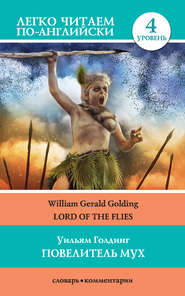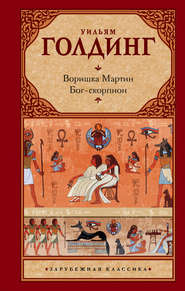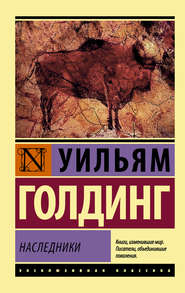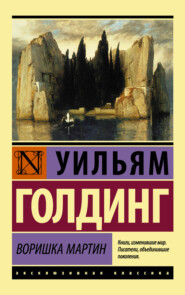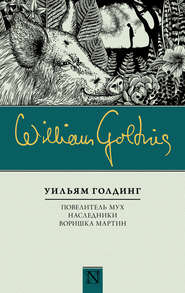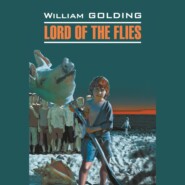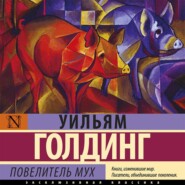По всем вопросам обращайтесь на: info@litportal.ru
(©) 2003-2025.
✖
Повелитель мух / Lord of the Flies
Настройки чтения
Размер шрифта
Высота строк
Поля
“That’s what I said! I said about our meetings and things and then you said shut up—”
His voice lifted into the whine of virtuous recrimination. They stirred and began to shout him down.
“You said you wanted a small fire and you been and built a pile like a hayrick. If I say anything,” cried Piggy, with bitter realism, “you say shut up; but if Jack or Maurice or Simon—”
He paused in the tumult, standing, looking beyond them and down the unfriendly side of the mountain to the great patch where they had found dead wood. Then he laughed so strangely that they were hushed, looking at the flash of his spectacles in astonishment. They followed his gaze to find the sour joke.
“You got your small fire all right.”
Smoke was rising here and there among the creepers that festooned the dead or dying trees. As they watched, a flash of fire appeared at the root of one wisp, and then the smoke thickened. Small flames stirred at the trunk of a tree and crawled away through leaves and brushwood, dividing and increasing. One patch touched a tree trunk and scrambled up like a bright squirrel. The smoke increased, sifted, rolled outwards. The squirrel leapt on the wings of the wind and clung to another standing tree, eating downwards. Beneath the dark canopy of leaves and smoke the fire laid hold on the forest and began to gnaw. Acres of black and yellow smoke rolled steadily toward the sea. At the sight of the flames and the irresistible course of the fire, the boys broke into shrill, excited cheering. The flames, as though they were a kind of wild life, crept as a jaguar creeps on its belly toward a line of birch-like saplings that fledged an outcrop of the pink rock. They flapped at the first of the trees, and the branches grew a brief foliage of fire. The heart of flame leapt nimbly across the gap between the trees and then went swinging and flaring along the whole row of them. Beneath the capering boys a quarter of a mile square of forest was savage with smoke and flame. The separate noises of the fire merged into a drum-roll that seemed to shake the mountain.
“You got your small fire all right.”
Startled, Ralph realized that the boys were falling still and silent, feeling the beginnings of awe at the power set free below them. The knowledge and the awe made him savage.
“Oh, shut up!”
“I got the conch,” said Piggy, in a hurt voice. “I got a right to speak.”
They looked at him with eyes that lacked interest in what they saw, and cocked ears at the drum-roll of the fire. Piggy glanced nervously into hell and cradled the conch.
“We got to let that burn out now. And that was our firewood.”
He licked his lips.
“There ain’t nothing we can do. We ought to be more careful. I’m scared—”
Jack dragged his eyes away from the fire.
“You’re always scared. Yah—Fatty!”
“I got the conch,” said Piggy bleakly. He turned to Ralph. “I got the conch, ain’t I Ralph?”
Unwillingly Ralph turned away from the splendid, awful sight.
“What’s that?”
“The conch. I got a right to speak.”
The twins giggled together.
“We wanted smoke—”
“Now look—!”
A pall stretched for miles away from the island. All the boys except Piggy started to giggle; presently they were shrieking with laughter.
Piggy lost his temper.
“I got the conch! Just you listen! The first thing we ought to have made was shelters down there by the beach. It wasn’t half cold down there in the night. But the first time Ralph says ’fire’ you goes howling and screaming up this here mountain. Like a pack of kids!”
By now they were listening to the tirade.
“How can you expect to be rescued if you don’t put first things first and act proper?”
He took off his glasses and made as if to put down the conch; but the sudden motion toward it of most of the older boys changed his mind. He tucked the shell under his arm, and crouched back on a rock.
“Then when you get here you build a bonfire that isn’t no use. Now you been and set the whole island on fire. Won’t we look funny if the whole island burns up? Cooked fruit, that’s what we’ll have to eat, and roast pork. And that’s nothing to laugh at! You said Ralph was chief and you don’t give him time to think. Then when he says something you rush off, like, like—”
He paused for breath, and the fire growled at them.
“And that’s not all. Them kids. The little ’uns. Who took any notice of ’em? Who knows how many we got?”
Ralph took a sudden step forward.
“I told you to. I told you to get a list of names!”
“How could I,” cried Piggy indignantly, “all by myself? They waited for two minutes, then they fell in the sea; they went into the forest; they just scattered everywhere. How was I to know which was which?”
Ralph licked pale lips.
“Then you don’t know how many of us there ought to be?”
“How could I with them little ’uns running round like insects? Then when you three came back, as soon as you said make a fire, they all ran away, and I never had a chance—”
“That’s enough!” said Ralph sharply, and snatched back the conch. “If you didn’t you didn’t.”
“—then you come up here an’ pinch my specs—”
Jack turned on him.
“You shut up!”
“—and them little ’uns was wandering about down there where the fire is. How d’you know they aren’t still there?”
Piggy stood up and pointed to the smoke and flames. A murmur rose among the boys and died away. Something strange was happening to Piggy, for he was gasping for breath.
“That little ’un—” gasped Piggy—“him with the mark on his face, I don’t see him. Where is he now?”
The crowd was as silent as death.
“Him that talked about the snakes. He was down there—”
A tree exploded in the fire like a bomb. Tall swathes of creepers rose for a moment into view, agonized, and went down again. The little boys screamed at them.
“Snakes! Snakes! Look at the snakes!”
In the west, and unheeded, the sun lay only an inch or two above the sea. Their faces were lit redly from beneath. Piggy fell against a rock and clutched it with both hands.
His voice lifted into the whine of virtuous recrimination. They stirred and began to shout him down.
“You said you wanted a small fire and you been and built a pile like a hayrick. If I say anything,” cried Piggy, with bitter realism, “you say shut up; but if Jack or Maurice or Simon—”
He paused in the tumult, standing, looking beyond them and down the unfriendly side of the mountain to the great patch where they had found dead wood. Then he laughed so strangely that they were hushed, looking at the flash of his spectacles in astonishment. They followed his gaze to find the sour joke.
“You got your small fire all right.”
Smoke was rising here and there among the creepers that festooned the dead or dying trees. As they watched, a flash of fire appeared at the root of one wisp, and then the smoke thickened. Small flames stirred at the trunk of a tree and crawled away through leaves and brushwood, dividing and increasing. One patch touched a tree trunk and scrambled up like a bright squirrel. The smoke increased, sifted, rolled outwards. The squirrel leapt on the wings of the wind and clung to another standing tree, eating downwards. Beneath the dark canopy of leaves and smoke the fire laid hold on the forest and began to gnaw. Acres of black and yellow smoke rolled steadily toward the sea. At the sight of the flames and the irresistible course of the fire, the boys broke into shrill, excited cheering. The flames, as though they were a kind of wild life, crept as a jaguar creeps on its belly toward a line of birch-like saplings that fledged an outcrop of the pink rock. They flapped at the first of the trees, and the branches grew a brief foliage of fire. The heart of flame leapt nimbly across the gap between the trees and then went swinging and flaring along the whole row of them. Beneath the capering boys a quarter of a mile square of forest was savage with smoke and flame. The separate noises of the fire merged into a drum-roll that seemed to shake the mountain.
“You got your small fire all right.”
Startled, Ralph realized that the boys were falling still and silent, feeling the beginnings of awe at the power set free below them. The knowledge and the awe made him savage.
“Oh, shut up!”
“I got the conch,” said Piggy, in a hurt voice. “I got a right to speak.”
They looked at him with eyes that lacked interest in what they saw, and cocked ears at the drum-roll of the fire. Piggy glanced nervously into hell and cradled the conch.
“We got to let that burn out now. And that was our firewood.”
He licked his lips.
“There ain’t nothing we can do. We ought to be more careful. I’m scared—”
Jack dragged his eyes away from the fire.
“You’re always scared. Yah—Fatty!”
“I got the conch,” said Piggy bleakly. He turned to Ralph. “I got the conch, ain’t I Ralph?”
Unwillingly Ralph turned away from the splendid, awful sight.
“What’s that?”
“The conch. I got a right to speak.”
The twins giggled together.
“We wanted smoke—”
“Now look—!”
A pall stretched for miles away from the island. All the boys except Piggy started to giggle; presently they were shrieking with laughter.
Piggy lost his temper.
“I got the conch! Just you listen! The first thing we ought to have made was shelters down there by the beach. It wasn’t half cold down there in the night. But the first time Ralph says ’fire’ you goes howling and screaming up this here mountain. Like a pack of kids!”
By now they were listening to the tirade.
“How can you expect to be rescued if you don’t put first things first and act proper?”
He took off his glasses and made as if to put down the conch; but the sudden motion toward it of most of the older boys changed his mind. He tucked the shell under his arm, and crouched back on a rock.
“Then when you get here you build a bonfire that isn’t no use. Now you been and set the whole island on fire. Won’t we look funny if the whole island burns up? Cooked fruit, that’s what we’ll have to eat, and roast pork. And that’s nothing to laugh at! You said Ralph was chief and you don’t give him time to think. Then when he says something you rush off, like, like—”
He paused for breath, and the fire growled at them.
“And that’s not all. Them kids. The little ’uns. Who took any notice of ’em? Who knows how many we got?”
Ralph took a sudden step forward.
“I told you to. I told you to get a list of names!”
“How could I,” cried Piggy indignantly, “all by myself? They waited for two minutes, then they fell in the sea; they went into the forest; they just scattered everywhere. How was I to know which was which?”
Ralph licked pale lips.
“Then you don’t know how many of us there ought to be?”
“How could I with them little ’uns running round like insects? Then when you three came back, as soon as you said make a fire, they all ran away, and I never had a chance—”
“That’s enough!” said Ralph sharply, and snatched back the conch. “If you didn’t you didn’t.”
“—then you come up here an’ pinch my specs—”
Jack turned on him.
“You shut up!”
“—and them little ’uns was wandering about down there where the fire is. How d’you know they aren’t still there?”
Piggy stood up and pointed to the smoke and flames. A murmur rose among the boys and died away. Something strange was happening to Piggy, for he was gasping for breath.
“That little ’un—” gasped Piggy—“him with the mark on his face, I don’t see him. Where is he now?”
The crowd was as silent as death.
“Him that talked about the snakes. He was down there—”
A tree exploded in the fire like a bomb. Tall swathes of creepers rose for a moment into view, agonized, and went down again. The little boys screamed at them.
“Snakes! Snakes! Look at the snakes!”
In the west, and unheeded, the sun lay only an inch or two above the sea. Their faces were lit redly from beneath. Piggy fell against a rock and clutched it with both hands.






